Main convict in Russia: Who is Navalny and why he was jailed
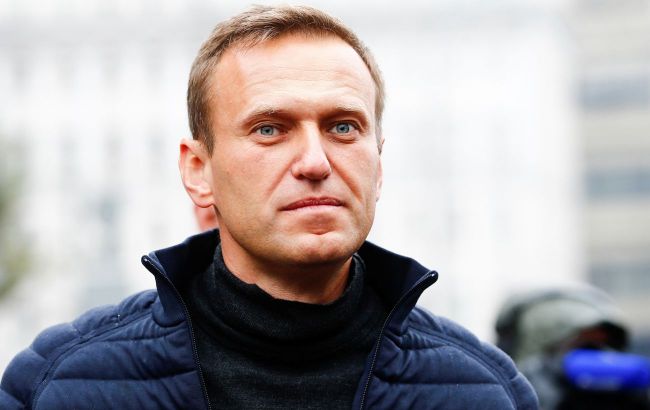 Alexei Navalny (Getty Images)
Alexei Navalny (Getty Images)
On February 16, it became known that Alexei Navalny had died in a high-security prison in the Yamalo-Nenets Autonomous Okrug, where he had been serving his sentence since December 2023. His death was announced by the Federal Penitentiary Service of Russia. However, his lawyers have not yet confirmed his death.
How Navalny gained fame, why he was poisoned, and for what he was sentenced to 19 years in a strict regime colony in the Russian Arctic – read in the article by RBC-Ukraine.
Sources: official comments from Russian state agencies, Navalny's investigations, as well as data from open sources.
Who is Navalny
Alexei Navalny is one of the leaders of the Russian opposition. He gained fame for his investigations into Russian President Vladimir Putin, former President Dmitry Medvedev (He Is Not Dimon To You), Kremlin corruption schemes, and opposition activities. In one of his most famous investigations, Navalny revealed Putin's palace, which shocked the public. His team revealed that the palace included a home theater, fur coat room, vineyards, and more. Concurrently, Navalny established the Anti-Corruption Foundation and its subsidiary projects such as Smart Voting, Navalny's Trade Union, RosYama, Good Truth Machine, and others.
He ran for mayor of Moscow in 2013, losing to Sergey Sobyanin. That same year, he became the leader of the Central Council of the political party Russia of the Future. In 2016, he announced his intention to run for the Russian presidency, but in 2017, the Central Election Commission refused to register him because of an outstanding conviction in the Kirovles case. In 2017-18, he led a mass protest movement across Russian cities demanding an end to Vladimir Putin's presidency. The protests ended with the mass arrests of participants.
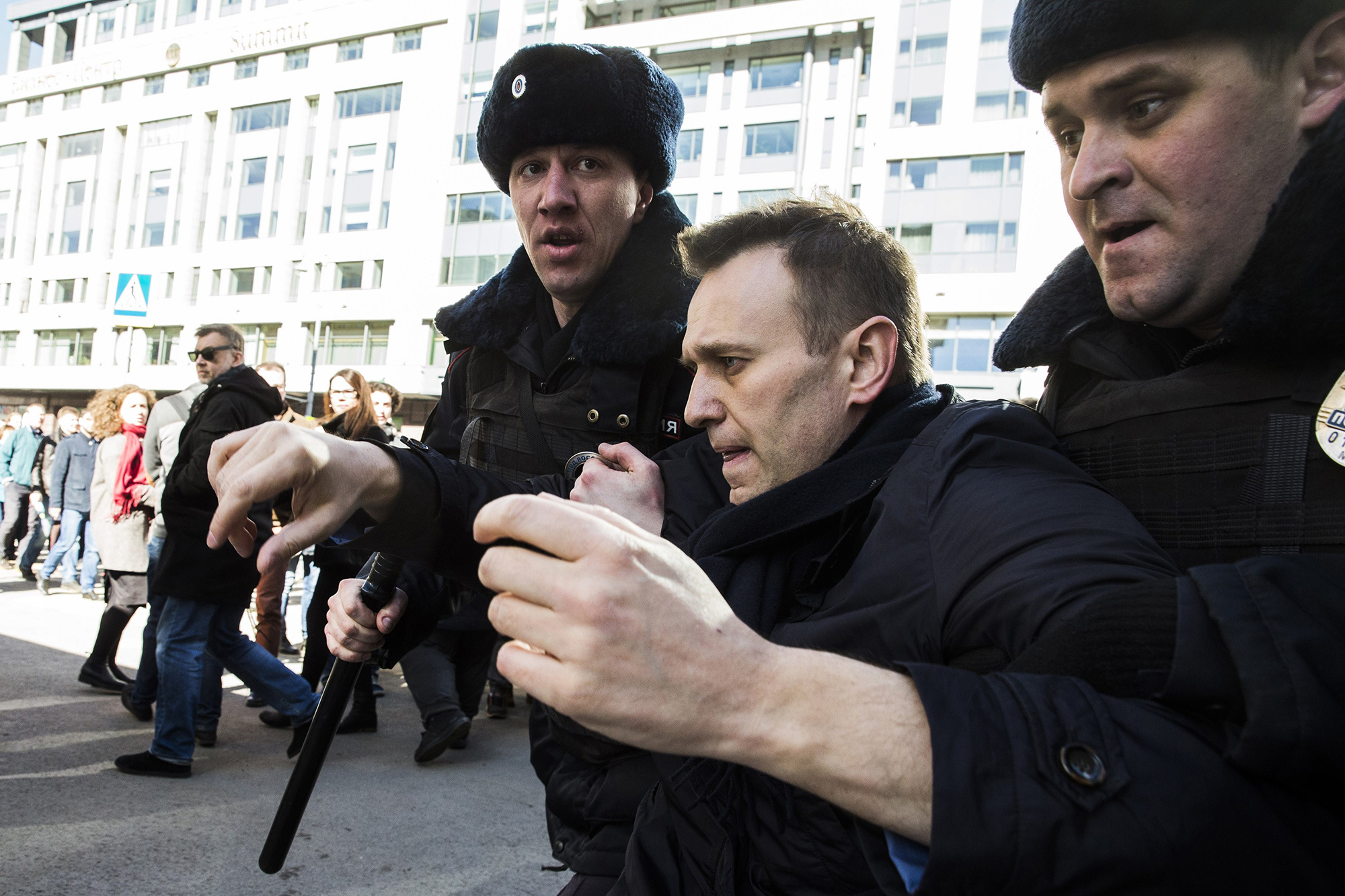 Alexei Navalny during rallies in Moscow (photo: Getty Images)
Alexei Navalny during rallies in Moscow (photo: Getty Images)
Navalny was praised by Western politicians for his opposition activities. In 2012 and 2021, Time magazine included him in the list of the 100 most influential people of the year. In 2017 and 2019, he was elected Politician of the Year according to Vedomosti and ranked in the trust rating among Russians. In October 2021, the European Parliament awarded him the Sakharov Prize, and in 2022, he was nominated for the Nobel Peace Prize.
Poisoning and arrest
On August 20, 2020, Navalny fell ill and lost consciousness on a flight from Tomsk to Moscow. Later, medics determined that Navalny had been poisoned with the nerve agent Novichok. Russian authorities denied involvement. As a result of the poisoning, Navalny fell into a coma. Initially, he was taken to a hospital in Omsk. Two days later, he was transferred to Berlin, to the Charité clinic. On September 22, he was discharged, but until January, he underwent rehabilitation in Germany. He then announced his decision to return to Russia despite numerous attempts by his colleagues to dissuade him.
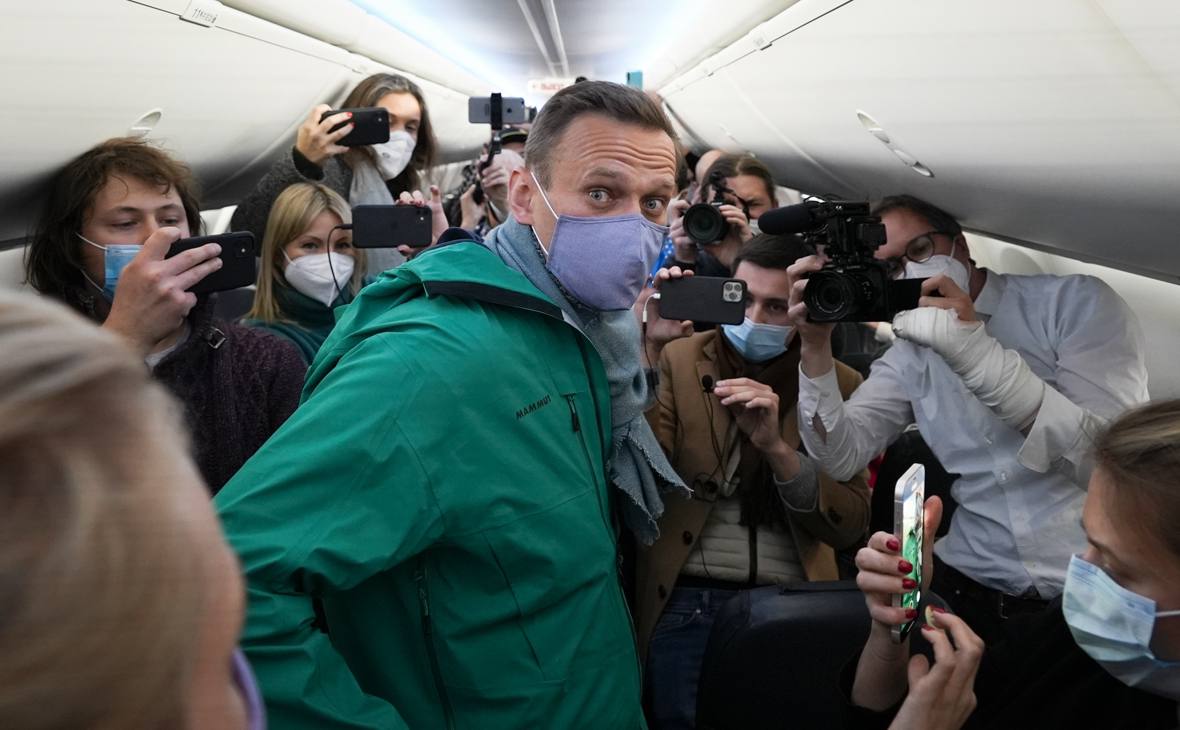 Navalny returns to Moscow (photo: Navalny's Facebook)
Navalny returns to Moscow (photo: Navalny's Facebook)
On January 17, 2021, Navalny returned to Moscow, where he was arrested instantly at the airport. Despite significant public outcry and demands from various Western politicians and organizations, including the European Court of Human Rights (ECHR), to release Navalny, he was arrested.
Since 2010, Navalny has been facing suspicion in a series of criminal and administrative cases. In 2013, he was found guilty in a case involving the embezzlement of assets from the Kirovles company and sentenced to 5 years in prison, but the next day after the verdict, the court changed the precautionary measure to travel restrictions.
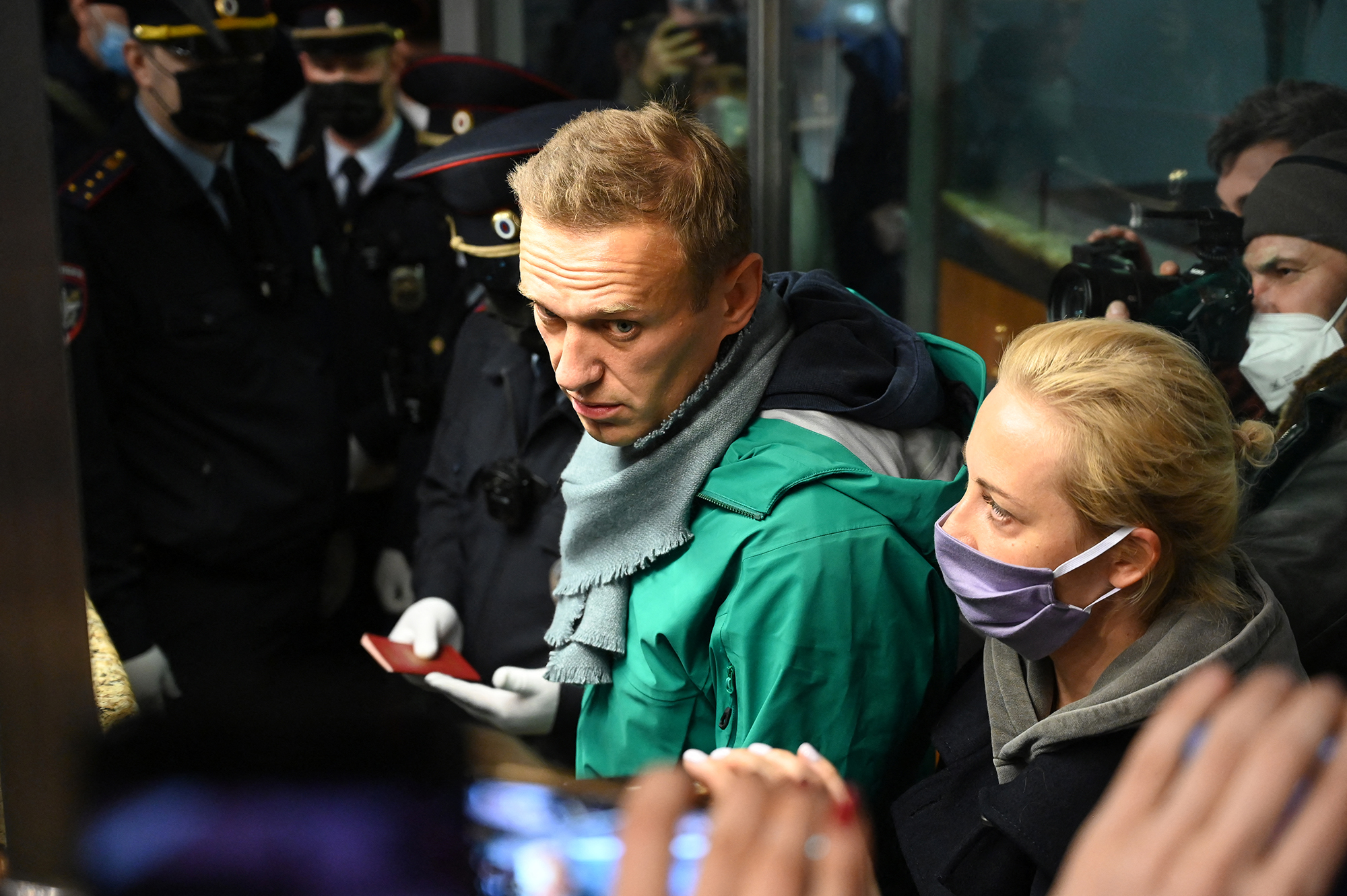
Navalny was arrested at the airport (photo: Getty Images)
That same year, a trial began in the Yves Rocher case. In December 2014, Navalny was sentenced to 3 years and 6 months of suspended sentence in this case. Both cases were appealed by Navalny to the ECHR, which recognized that the proceedings were conducted with violations. Later, both the ECHR and human rights organizations acknowledged that the cases against Navalny were politically motivated.
Nevertheless, in 2021, upon his return from Germany, Navalny was detained in the gray zone of the airport by the officers of the Federal Penitentiary Service (FPS), stating that the opposition figure had violated the conditions of his probation in the Yves Rocher case by not reporting to the authorities while in Germany. Navalny's arrest sparked a massive reaction from world leaders, who demanded his immediate release without any preconditions.
Despite the criticism and demands for action, on January 18, Navalny was arrested for 30 days. Journalists were not allowed in the courtroom, and a rally in support of Navalny was held outside the courthouse. On February 21, the Simonovsky District Court replaced Navalny's suspended sentence in the Yves Rocher case with a real prison term. Representatives of 14 diplomatic missions attended the trial. Navalny was sentenced to 2 years and 8 months in a general regime penal colony.
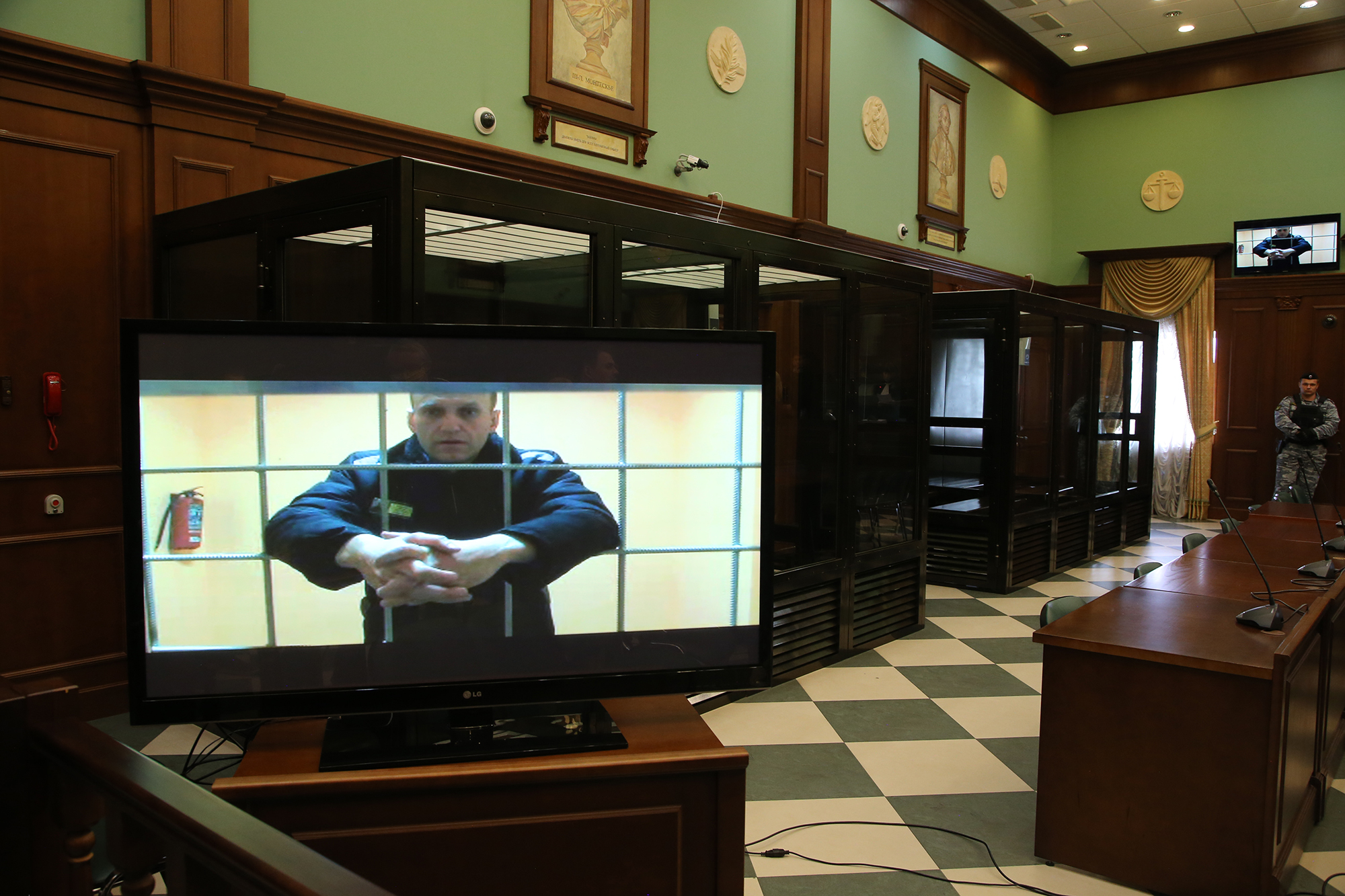 Navalny speaks in court via video (photo: Getty Images)
Navalny speaks in court via video (photo: Getty Images)
In late February 2021, he was transferred from the Matrosskaya Tishina detention center to the Kolchugino colony in Vladimir. His team regularly argued that Navalny was being tortured, and his health was deteriorating. Navalny himself said in letters that he was deprived of sleep, subjected to psychological abuse, and threatened. After numerous demands for the FPS to check Navalny's health, they agreed to send him for a medical examination, which concluded that the opposition leader's condition was "satisfactory."
On March 31, 2021, Navalny announced a hunger strike until civilian doctors were allowed to see him. Concurrently, French President Emmanuel Macron and then-German Chancellor Angela Merkel appealed to Putin demanding Navalny's release. The Kremlin did not respond. On October 11, 2021, Navalny was registered as prone to terrorism and extremism.
Cases for 9- and 19-years-sentences
On February 15, 2022, an off-site session of the Lefortovo District Court of Moscow began at VK-2 in the case of fraud and contempt of court. Navalny was accused of misappropriating funds from the foundation. The proceedings were combined into one. Navalny's lawyers demanded that the case be heard in Moscow, arguing that the off-site session was deliberately arranged to complicate the process of its coverage.
On March 18, 2022, Navalny was found guilty of fraud and contempt of court, sentencing him to 9 years in a strict regime colony.
On May 31, 2022, the Investigative Committee of the Russian Federation filed new charges against Navalny - this time for creating an extremist community. Initially, the accusation called for 10 years, later revised to 20 years of imprisonment. The trial began on June 19, 2023, at VK-6. On August 4, Navalny was found guilty and sentenced to 19 years in a high-security prison and fined 500,000 rubles. In September 2023, after an appeal trial, Navalny was transferred to a single-chambered cell, which is the harshest form of punishment in prisons.
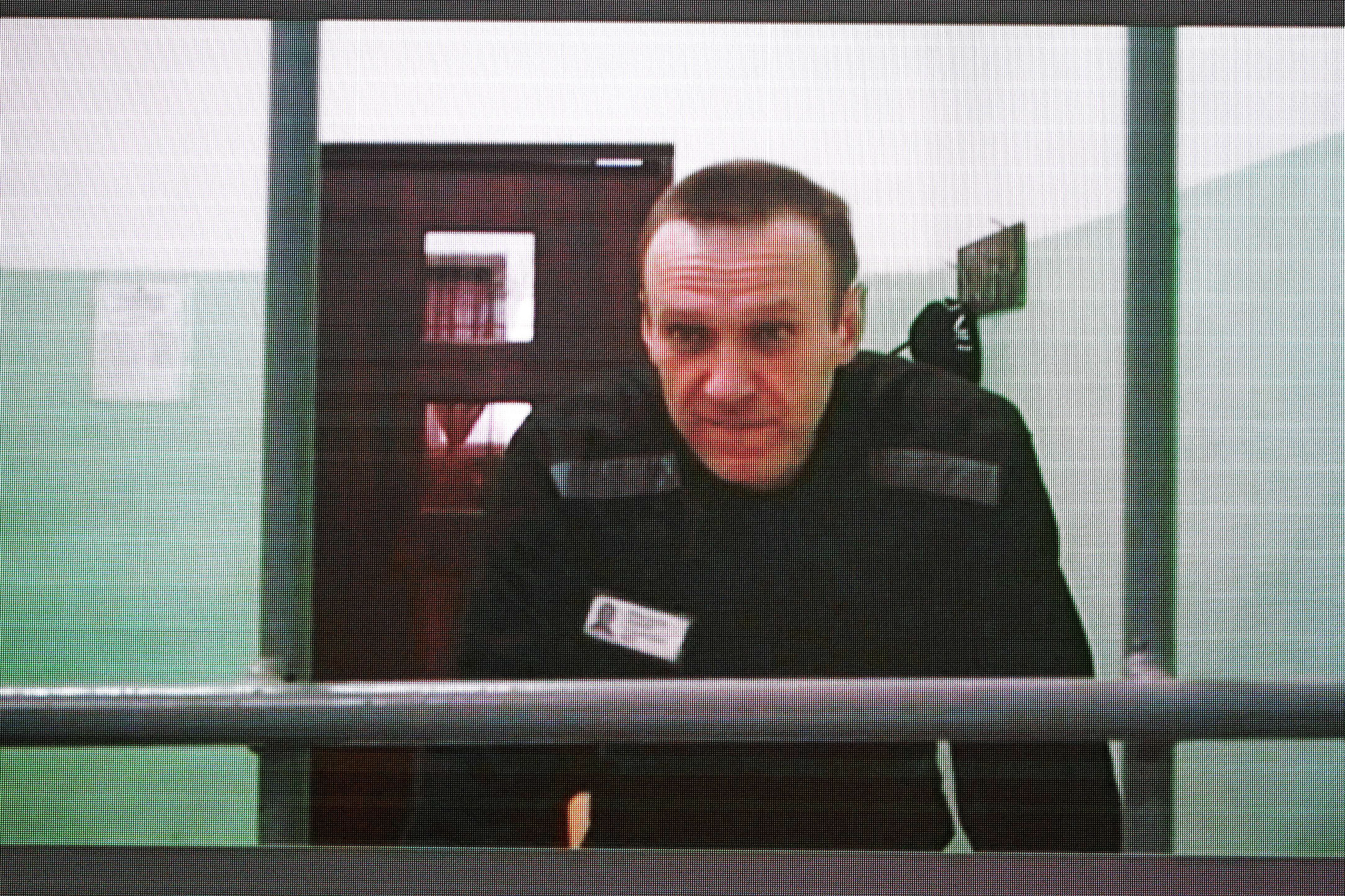 Another court with Navalny via video (photo: Getty Images)
Another court with Navalny via video (photo: Getty Images)
In VK-6 in the Vladimir region, Navalny worked in a sewing workshop. According to him, after work, "educational measures" were carried out with him, during which he had to "sit on a wooden bench under a portrait of Putin" for 6 hours straight. In November 2022, he stopped receiving letters from relatives. Overall, the opposition figure was often deprived of various privileges of prisoners for various infractions. For instance, for using obscene language, he was sent to solitary confinement. Several times, a person with hygiene issues was placed in his cell, according to Navalny. At times, Navalny was woken up every hour at night, allegedly to ensure he didn't escape.
In February 2023, Navalny began experiencing stomach problems, causing him to lose 7 kilograms. In December 2023, he was not connected to video communication during a court hearing, citing technical reasons. On December 11, prison staff announced that the opposition figure was no longer in their custody. On January 26, it became known that Navalny had been transferred to a correctional colony in the Yamalo-Nenets Autonomous Okrug. He wrote on Facebook that he was transferred within 20 days.
"The exercise yard is the neighboring cell, slightly larger in size, with snow on the floor. And the convoy, it's not like in central Russia, it's like in the movies - with rifles, warm gloves, felt boots with fluffy German Shepherdі. Overall, don't worry about me. I'm fine. I'm terribly glad to have finally arrived," Navalny wrote.
Announcement of Navalny's death
On February 16, 2024, the Federal Penitentiary Service of Russia for the Yamalo-Nenets Autonomous Okrug announced that Alexei Navalny had died in prison during a walk.
"Medical workers of the institution immediately arrived, and an ambulance team was called. All necessary resuscitation measures were taken, which did not deliver positive results. Emergency medical workers pronounced the convicted person dead," the website reports.
Russian propagandists added that he supposedly suffered a thrombus detachment. Navalny's team has not yet confirmed his death. The Kremlin's pool of journalists has already announced Putin's statements on this matter. Ukrainian President Volodymyr Zelenskyy stated that Navalny was obviously killed by Vladimir Putin.

